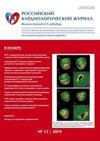Assessing long-term symptoms in patients with post-pulmonary embolism syndrome using patientreported outcome measures
Q3 Medicine
引用次数: 0
Abstract
People who survive an episode of pulmonary embolism have an increased risk of developing chronic complications despite curative anticoagulant treatment. The association of dyspnoea, low functional capacity, right heart failure, chronic thromboembolic pulmonary hypertension, or chronic thromboembolic pulmonary disease is part of the notion of post-pulmonary embolic syndrome (PPES). The symptoms can be limiting, substantially affecting the quality of life. To improve the overall health outcomes of patients with acute pulmonary embolism, adequate measures to diagnose it and strategies to prevent long-term outcomes of pulmonary embolism are essential.The objective of this study is to provide a definition of PPES and review the most recommended patient-reported outcome measures (PROMs) for assessing the functionality of these patients.We searched PubMed for papers from the last 5 years that contain the terms: postpulmonary embolism syndrome; symptoms; PROMs; score; quality of life; dyspnea. Repetitive publications were excluded. The data from the publications have been summarized in this descriptive overview.使用患者报告结果指标评估肺栓塞后综合征患者的长期症状
肺栓塞患者在接受抗凝治疗后仍有可能出现慢性并发症。呼吸困难、功能低下、右心衰竭、慢性血栓栓塞性肺动脉高压或慢性血栓栓塞性肺病是肺栓塞后综合征(PPES)概念的一部分。肺栓塞后综合征是肺栓塞后综合征(PPES)概念的一部分,其症状可能是限制性的,严重影响生活质量。为了改善急性肺栓塞患者的总体健康状况,必须采取适当的诊断措施和策略来预防肺栓塞的长期后果。本研究的目的是提供PPES的定义,并回顾最值得推荐的用于评估这些患者功能的患者报告结果测量指标(PROMs)。我们在PubMed上搜索了过去5年中包含以下术语的论文:肺栓塞后综合征;症状;PROMs;评分;生活质量;呼吸困难。排除了重复发表的文献。本报告概述了这些出版物中的数据。
本文章由计算机程序翻译,如有差异,请以英文原文为准。
求助全文
约1分钟内获得全文
求助全文
来源期刊

Russian Journal of Cardiology
Medicine-Cardiology and Cardiovascular Medicine
CiteScore
2.20
自引率
0.00%
发文量
185
审稿时长
1 months
期刊介绍:
Russian Journal of Cardiology has been issued since 1996. The language of this publication is Russian, with tables of contents and abstracts of all articles presented in English as well. Editor-in-Chief: Prof. Eugene V.Shlyakhto, President of the Russian Society of Cardiology.
The aim of the journal is both scientific and practical, also with referring to organizing matters of the Society. The best of all cardiologic research in Russia is submitted to the Journal. Moreover, it contains useful tips and clinical examples for practicing cardiologists. Journal is peer-reviewed, with multi-stage editing. The editorial board is presented by the leading cardiologists from different cities of Russia.
 求助内容:
求助内容: 应助结果提醒方式:
应助结果提醒方式:


